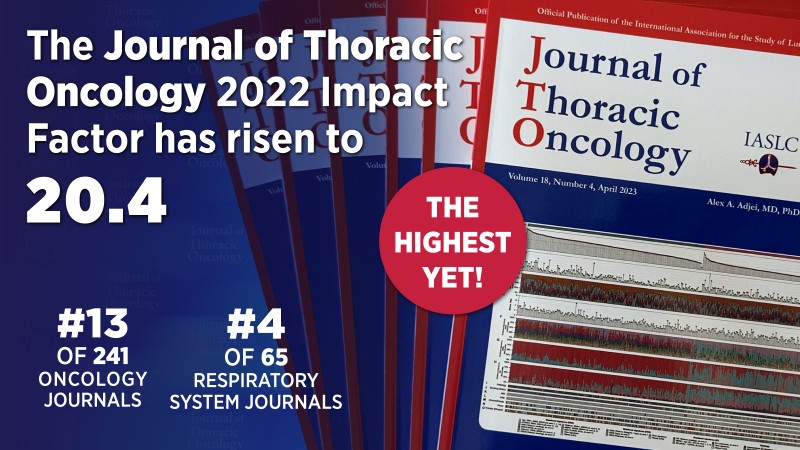
Chris Martin | Cmartin@davidjamesgroup.com | 630.670.2745
DENVER – The International Association for the Study of Lung Cancer (IASLC) today reported that its main cancer journal, the Journal of Thoracic Oncology (JTO), improved its Impact Factor from 20.1 in 2022 to 20.4 this year. The JTO, the official journal of the IASLC, ranks fourth among 65 respiratory medicine journals and 13th among 241 oncology journals.
Impact Factors are measured by calculating the number of times journal articles in the two preceding years are cited in a current year. Thus, the Impact Factor for 2023 is the number of times articles published in 2020 and 2021 are cited in 2022.
The higher the Impact Factor, the more highly ranked the journal. Journal citation reports are issued by Clarivate Analytics.
The JTO is the primary educational publication for topics relevant to the prevention, detection, diagnosis, and treatment of all thoracic malignancies. Emphasizing a multidisciplinary approach, the JTO includes original research, review articles, and opinion pieces. The audience includes epidemiologists, medical oncologists, radiation oncologists, thoracic surgeons, pulmonologists, radiologists, pathologists, and basic scientists with a special interest in thoracic oncology.
“As the leading thoracic oncology journal, its strength is in its multidisciplinary approach to research, JTO will continue its emphasis on multidisciplinary research to serve the broad community working in thoracic oncology,” said Editor-in-Chief Alex A. Adjei, M.D.
It is generally difficult for organ-specific oncology journals to make a significant impact in the oncology publishing landscape. With an Impact Factor of 20.4, JTO is the leading journal in thoracic oncology and in the top fifteen of all cancer journals. As the leading thoracic oncology journal, its strength is in its multidisciplinary approach to research.
JTO continues to have a quick turn-around time of one week to initial decision, and an average of 1.6 weeks for revisions, a fast-track category, publish on acceptance, and promotion of select articles via social media and press releases. The IASLC's open-access journal, JTO Clinical and Research Reports, was launched to expand their ability to publish quality research in thoracic oncology. Authors can promote their own research by utilizing Elsevier enhancements such as Sharelink.
To submit a manuscript or to learn more about the JTO, please visit jto.org. Once there, you can peruse current in-press articles, collections of lung cancer staging and pathology articles, and the freely available Editor’s Choice articles. The complete contents of the JTO are a free benefit for IASLC members.
###
About the IASLC
The International Association for the Study of Lung Cancer (IASLC) is the only global organization dedicated solely to the study of lung cancer and other thoracic malignancies. Founded in 1974, the association's membership includes more than 10,000 lung cancer specialists across all disciplines in over 100 countries, forming a global network working together to conquer lung and thoracic cancers worldwide. The association also publishes the Journal of Thoracic Oncology, the primary educational and informational publication for topics relevant to the prevention, detection, diagnosis, and treatment of all thoracic malignancies. Visit www.iaslc.org for more information.
About the JTO
Journal of Thoracic Oncology (JTO), the official journal of the International Association for the Study of Lung Cancer, is the primary educational and informational publication for topics relevant to the prevention, detection, diagnosis, and treatment of all thoracic malignancies. JTO emphasizes a multidisciplinary approach and includes original research reviews and opinion pieces. The audience includes epidemiologists, medical oncologists, radiation oncologists, thoracic surgeons, pulmonologists, radiologists, pathologists, nuclear medicine physicians, and research scientists with a special interest in thoracic oncology.
